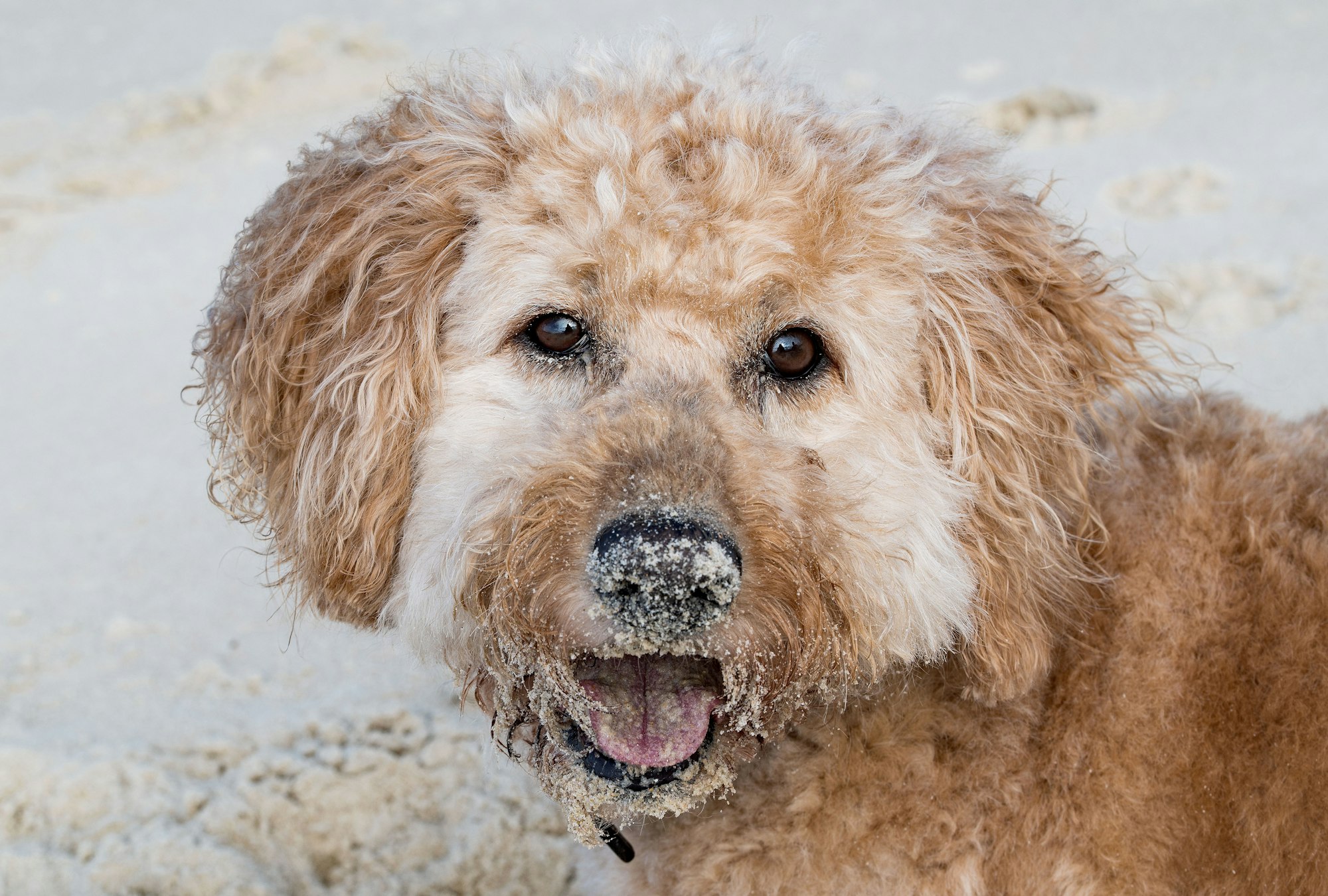Welcome to the Labradoodle story, an intriguing narrative of how two different breeds came together to create the ideal family companion. If you're a dog lover, you're in for a treat as we unravel this story.
The Dawn of the Labradoodle
The Labradoodle was born out of a need. It all started in the late 1980s when an Australian man received a request from a woman in Hawaii. She was visually impaired and needed a guide dog. But there was a twist – her husband was allergic to dogs. The Royal Guide Dog Association of Australia took up the challenge, and the quest to create an allergy-friendly guide dog began.
A Stroke of Genius and a Dash of Luck
The first Labradoodle was not an accident, but the result of a planned breeding. The Association chose a Labrador Retriever for its excellent guide dog traits and a Standard Poodle for its low-shedding coat. The first litter produced a pup named Sultan, who was just the perfect blend of both worlds. This marked the beginning of the Labradoodle breed.

Why Labradoodles Make Ideal Family Companions
Labradoodles inherited the best of both their parent breeds. From Labradors, they got their intelligence, good nature, and the irresistible desire to please. Poodles contributed their low-shedding coat and high intelligence.
A Labradoodle in the Family
Imagine coming home from a long day at work. As soon as you open the door, a bundle of joy rushes towards you, wagging its tail, ready to shower you with licks and love. That's a Labradoodle for you. Their easygoing nature makes them adaptable, comfortable in apartments or large houses, as long as they are showered with love and attention.
A Healthy Lifestyle for a Labradoodle
Just like humans, Labradoodles thrive when they have a healthy lifestyle. Regular exercise and a balanced diet are key to their well-being. Moreover, engaging your Labradoodle in dog sports can provide mental stimulation and physical exertion.
Training Your Labradoodle
Training a Labradoodle can be a rewarding experience. These dogs are intelligent and eager to please, making them quick learners. When it comes to training, positive reinforcement methods work best. Praising them or giving them treats for good behavior will motivate them to learn faster.
The Importance of Grooming
Learning how to properly groom a dog is crucial, especially when you own a Labradoodle. Regular brushing helps keep their coat healthy and shiny. Paying attention to their skin is also important, as scratching and licking can be signs of skin issues.

Dental Health Matters
Did you know that dogs can suffer from tooth decay just like humans? Regular dental check-ups and teeth cleaning are essential for maintaining your Labradoodle's overall health. Providing them with dental chews or using a dog-friendly toothpaste can help prevent dental issues.
Picking the Perfect Labradoodle
Selecting a Labradoodle is not just about picking the cutest puppy. It's about finding the dog that fits your lifestyle and preferences. Speaking to reputable breeders, visiting shelters, or researching online can be excellent ways to find your perfect Labradoodle companion.
The Labradoodle and You
The Labradoodle story is a testament to the innovative spirit of humans and the adaptability of dogs. It's the story of a dog that was bred for a purpose and ended up being a wonderful family companion.
As the final tip, using a scratch board can be an effective way to keep your Labradoodle's nails short and neat. Not only does it save you a trip to the groomer, but it can also provide an outlet for your dog's natural scratching instincts.
In the end, owning a Labradoodle is not just about having a pet; it's about welcoming a new member into your family. So if you're considering getting a Labradoodle, remember that it's not just about the destination, but also about the journey you'll share together.
Understanding the Labradoodle Temperament
As we dive deeper into the Labradoodle story, understanding their temperament is crucial. Labradoodles have a reputation for being friendly, intelligent, and sociable dogs. With their Labrador Retriever ancestry, they have a natural enthusiasm and zest for life. They are typically outgoing, and they enjoy social interactions, whether with people or other dogs.
From their Poodle side, they have inherited an inquisitive nature and an impressive degree of intelligence. Poodles rank as one of the smartest breeds, which translates into Labradoodles being quick learners, capable of understanding and responding to a wide array of commands.
Training: A Key to a Well-Behaved Labradoodle
One of the aspects you must consider as a Labradoodle owner is the importance of training. Given their intelligence and desire to please, Labradoodles respond exceptionally well to training sessions. As previously mentioned, positive reinforcement is highly effective, using treats or praises to reward the right behavior.
But remember, consistency is key. Regular training sessions will help keep their sharp minds stimulated and ensure they remain well-behaved, both at home and in public.
Labradoodles and Children: A Match Made in Heaven
Their amicable nature makes Labradoodles great companions for children. Their playful spirit and patience match well with the energy levels of young kids. A Labradoodle can be a child's playmate, nap buddy, or partner in crime. But remember, it's essential to teach children how to interact respectfully with dogs, ensuring a harmonious relationship.

Shedding and Allergies: A Major Consideration
One of the reasons Labradoodles gained popularity was their low-shedding coat, making them a suitable choice for allergy sufferers. However, it's essential to remember that no dog breed is 100% hypoallergenic. The Labradoodle's coat can vary, with some shedding more than others. If allergies are a concern, it's recommended to spend time with a Labradoodle before bringing one into your home.
Health Considerations for Labradoodles
While generally healthy, Labradoodles can be prone to certain health conditions. Regular check-ups with the vet are vital to detect any potential issues early on. Like all breeds, Labradoodles can develop certain genetic health issues, such as hip dysplasia and certain eye disorders.
Remember, the health of your Labradoodle isn't just about regular vet visits. A balanced diet, regular exercise, mental stimulation, and lots of love are also key components of a healthy life for your furry friend.
The Labradoodle Story Continues
The story of the Labradoodle doesn't end here. It continues with every pup born, every family they join, and every heart they touch. The Labradoodle has come a long way from its beginnings as an experimental breed to becoming one of the most loved family companions around the globe.
Labradoodles, with their striking looks, friendly demeanor, and adaptable nature, continue to win hearts worldwide. This story is a testament to the adaptability and love that dogs can offer, reinforcing why they indeed are man's best friend.
As a potential or current Labradoodle owner, you have the privilege of adding a new chapter to this ongoing narrative. Whether it's a tale of unforgettable adventures, shared quiet moments, or the unbreakable bond of friendship, the Labradoodle story continues with you.
Adding Tech to the Mix: The FI Dog Collar
The world is continually evolving, and technology has become an integral part of our lives. As a dog owner, this innovation can also benefit you and your Labradoodle. Enter the FI dog collar, a revolutionary gadget that promises to take your pet parenting experience to a new level.

Tech Meets Training
Training your Labradoodle is crucial, as we've discussed. But what if you could incorporate technology to make it even more effective? The FI dog collar comes with GPS tracking, providing an excellent tool to track your dog's location during those off-leash training sessions. It ensures your Labradoodle won't wander too far, giving you peace of mind.
An Active Life with Your Labradoodle
Remember the part about engaging your Labradoodle in dog sports? Well, the FI collar tracks your dog's steps, allowing you to monitor their daily activity levels. This way, you'll know if they're getting the exercise they need to lead a healthy lifestyle.
Never Lose Sight of Your Labradoodle
With their friendly nature and curiosity, Labradoodles might wander off when something catches their interest. Here, the FI collar's lost dog mode comes into play. With GPS tracking and real-time location updates, finding your furry friend becomes less of a challenge.
Health Monitoring
The FI collar doesn't just help you keep track of your Labradoodle's location, but it also aids in monitoring their health. The collar tracks your dog's activity levels, providing valuable data on their overall fitness. This way, you can adjust your dog's exercise and diet as necessary, ensuring they remain in optimal health.
Creating a Labradoodle-Friendly Home
Making your home Labradoodle-friendly doesn't just mean having a scratch board or toys scattered around. It also means ensuring their safety. The FI collar provides a digital safe zone, known as a geofence, that you can set up around your home. If your Labradoodle steps out of this zone, you'll receive an alert on your phone.
Frequently Asked Questions
1. What is the origin of the Labradoodle breed?
The Labradoodle breed originated in the late 1980s in Australia. The breed was created in response to a request for a hypoallergenic guide dog. A Labrador Retriever and a Standard Poodle were bred to create this unique breed.
2. Why are Labradoodles considered good family pets?
Labradoodles are known for their friendly, intelligent, and sociable nature. They inherit the best traits of both Labradors and Poodles, making them adaptable, trainable, and great with children and other pets.
3. What is the importance of training for Labradoodles?
Training is crucial for Labradoodles due to their high intelligence and energetic nature. Regular, consistent training sessions using positive reinforcement methods help keep their minds stimulated and their behavior in check.
4. How does the FI dog collar enhance the Labradoodle owner's experience?
The FI dog collar, with its GPS tracking, activity monitoring, and lost dog mode, helps owners ensure their Labradoodle's safety and health. It can be a valuable tool during training sessions and provide peace of mind when it comes to their pet's well-being.
5. Can Labradoodles live comfortably in apartments?
Yes, Labradoodles can adapt well to various living conditions, including apartments, as long as they get enough physical exercise and mental stimulation.
6. Are Labradoodles hypoallergenic?
While no dog breed is 100% hypoallergenic, Labradoodles are considered low-shedding dogs due to their Poodle genetics. However, individuals with severe allergies should spend time with a Labradoodle before deciding to adopt one.
7. What health issues are common in Labradoodles?
Labradoodles can be prone to certain health conditions such as hip dysplasia, certain eye disorders, and skin issues. Regular vet check-ups and a healthy lifestyle can help prevent and detect these conditions early.
8. What is the benefit of a scratch board for Labradoodles?
A scratch board is an effective tool to keep a Labradoodle's nails short and neat, which can save trips to the groomer and provide an outlet for your dog's natural scratching instincts.
Conclusion:
In conclusion, the Labradoodle's story is a unique tale of innovation, born out of necessity and blossoming into a global love affair with this delightful breed. The fusion of the intelligent, outgoing Labrador Retriever with the hypoallergenic, equally smart Poodle has given us a breed that's versatile, loving, and excellent for families.
From the importance of engaging in dog sports and regular grooming, to the necessity of keeping an eye on common health issues like tooth decay and skin problems, owning a Labradoodle is a rewarding journey.
The inclusion of the FI dog collar in this narrative is a testament to how technology can augment our relationship with our pets, making the Labradoodle experience even more fulfilling. Ultimately, each Labradoodle and owner add their own unique chapters to this ongoing story of companionship.